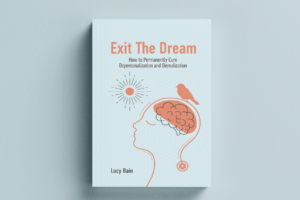Having researched and written about limerence for years, this is an angle I’m very passionate about. While I don’t like to use overly sensationalised language, limerence IS a behavioural addiction. You experience the lows because your limerent object (LO) makes you feel the emotional highs in the first place.
Let’s put it bluntly: you wouldn’t be in this much pain if your LO hadn’t first made your brain light up like a slot machine. They gave you that dopamine spike, that euphoric rush, that sense of being lit up from the inside out. And now? You’re crashing. Over and over. Because when they pull away – or don’t meet you at the same emotional depth – it’s not just sad. It feels like withdrawal. Because it is.
Always Remember, Limerence Is Addiction Hiding in Plain Sight
Think about narcotics; if someone doesn’t feel a blissful high from heroin, the withdrawal agony is impossible. Therefore, my approach to recovery centres around not avoiding the triggers, but making you TRULY immune to your LO and limerence in general by 1) meeting your own emotional needs so they 2) cannot GIVE you this electric, inflated, artificial high. I.e. ensuring your LO cannot make you feel the charged, mind-altering highs, and therefore, the lows and the pain.
This is the problem with limerence, and why you can’t romanticise and enjoy the positive emotions it involves. Because the highs never last, and are followed by intense lows when your LO – a normal, mortal human being – does not drop everything and enmesh with you physically and emotionally. Because no LO – no matter how charming, attractive, kind, or magnetic – can or will enmesh with you emotionally and physically forever. Not in the way limerence demands. Not in the way your nervous system is begging for.
But when your LO no longer CAN give you that intense high, and instead starts to seem neutral/insignificant (if they’re difficult/toxic) or great but like other people in your life (if they truly do have ladable traits)? It all changes in your favour. They can’t drop you into despair either. The whole system collapses – and that’s freedom. It’s 100% worth doing the work to become the person that accesses the feelings, attitudes and states they unlock in you. You ARE capable of this, and it’s the only thing that will truly free you. Everything else is just distraction and numbing.
In line with this, I encourage you to adopt this mentality: “no one should make me feel TOO good.”
I don’t mean you should detach from people or avoid fun, even thrilling, connections – whether they be romantic, platonic, or work-based. You are free and welcome to have as much fun as you possibly can in life, and there are sustainable ways to do it. But it CAN’T feel like a drug to you, in the way that limerence does. Because that only goes in one direction. Nothing good ever comes from fanning the flames of an all-encompassing, obsessive, drug-like connection.
Love That Greatly Elevates You Above Your ‘Normal’ Mood Isn’t Love You Can Keep
Limerence great content for movies, TV shows and has inspired many a great song, but this type of love is limiting, disempowering, and entirely NOT worth it. Why? Because:
a) Limerence is inherently imbalanced. Always.
Even if your LO seems equally obsessed – it never stays that way. It can’t. Limerence is built on inequality, on fantasy, on chasing something just out of reach. We get limerent over people who trigger our unmet emotional needs while showing up as their brightest, most magnetic, often unavailable selves. That’s the recipe. That’s why it hits so hard.
They might be charismatic. Confident. Mysterious. Or even just quietly kind in a way you never got growing up. Whatever it is – they mirror back something you’re starving for. So you attach. Hard. But the moment they mirror your intensity – the moment they become visibly lovesick or emotionally dependent on you? The limerence dies. It’s done.
That’s the imbalance. You’re hooked because of the gap. Because they feel just out of reach, but still close enough to spark hope. And the brain loves that hope. It feeds off the near-miss. It’s the same circuitry as gambling. You lose, lose, lose – but every once in a while, you get a “win.” A smile, a message, a great conversation — and you’re back in. Reinforced.
This is why limerence always feels like you’re chasing something. You’re not relating, you’re orbiting. You’re not grounded, you’re gripping. And even if they do reciprocate? The obsession usually dies once they’re emotionally available – and then you pull away, confused and empty. It’s never sustainable. And it’s never equal.
b) Limerence always hurts.
This is not just longing. This is agony. And it comes in waves. It’s waking up in the morning and immediately scanning for signs. It’s refreshing your phone. It’s replaying old conversations. It’s trying to “solve” the mystery of what they’re thinking. All of that? That’s pain. It just wears the costume of analysis or hope.
You crash because you flew so high. Because your LO became a source of dopamine, serotonin, meaning, identity – all of it. And when they inevitably don’t show up, don’t reply, don’t engage in the exact right way, you hit the wall.
It’s not “disappointment” – it’s withdrawal. And that withdrawal shows up like depression, anxiety, obsessive thoughts, even physical symptoms. That sinking stomach. The ache in your chest. The restlessness. That’s what behavioural addiction looks like when the drug is a person.
Even when they’re kind, or interested, or warm … it doesn’t save you. It keeps you hooked. You feel high for a second. Then you spiral again. Why? Because no one can consistently meet the fantasy you’ve built. No one can feed a nervous system that’s looking to fuse. They’ll disappoint you just by being human. And you’ll blame yourself. Or try harder. Or spiral into self-analysis. But the pain? That’s the signal. That’s the truth. It’s not working.
c) Limerence warps your behaviour.
It makes you act like someone you don’t even recognize. Not all at once — but gradually, and with subtle intensity. You start shaping your life around proximity. Saying yes to plans you don’t care about. Posting things so they’ll see them. Dressing a certain way, showing up at the right time, engineering interactions. You call it intuition – but it’s strategy. And it doesn’t feel good.
You stop being rooted in your own reality. Your nervous system is constantly scanning: where are they? Are they thinking about me? What did that message mean? Everything becomes about them – and how to get closer.
Even things that look positive – working out, dressing up, “glowing up” – are often driven by anxiety. You want to be seen. Chosen. You’re constantly preparing for them. And it’s exhausting.
If you share a social circle or workplace, it gets even messier. You find yourself navigating everything through the lens of “what will get me close to them.” You host gatherings you wouldn’t otherwise. You push conversations that feel forced. You try to control dynamics that aren’t yours to control. You know it’s unnatural — but you do it anyway.
And later? It feels gross. Embarrassing. Out of character. But that’s what limerence does. It hijacks your instincts. It makes you prioritize proximity over peace. Attention over dignity. Hope over truth.
d) You cannot – and will not – have a healthy relationship with your LO while you’re limerent.
This version of you – the one obsessing, fantasizing, waiting, adjusting your whole emotional state around crumbs of attention – cannot build something real with your LO. Not now. Not like this. You might believe that if only you could date them, things would finally feel calm. Stable. Settled. But they won’t. A relationship won’t fix this. It’ll expose it.
When you’re limerent, the idea of a relationship is just another version of the fantasy. You’re not seeing the actual person – you’re seeing the hit. You’re looking for regulation and relief through them. But that’s not love – that’s addiction in disguise. And when you’re trying to control how another person shows up just so you can feel OK? That’s not a relationship. That’s survival mode.
Let me be clear: I’m not recommending you entertain the idea of dating your LO right now. But int he 1/500 chance that you and your LO could be compatible as healthy partners with genuine, non‑elevated feelings for each other, you must heal first.
Sometimes, your LO really is kind, clever, present, emotionally available – and yet they trigger a deep wound in you. They fit your unmet needs so precisely that they seem golden. That doesn’t make them your soulmate; it exposes how much you’re looking for validation outside yourself.
There MIGHT be potential under different circumstances – if you were in a different place emotionally, at a different moment in time. But right now, you have to let go completely. You need to dismantle the fantasy and rebuild your own equilibrium. Only then can you enter a true, mutual relationship – if it’s meant to be. Fanning the flames of limerence will NEVER get you the outcome you want.
If you and your LO do ever reconnect, it won’t feel quite as euphoric as you imagine… nor should it. It will be possible because you no longer rely on their attention. Their presence or absence will no longer dictate your emotional state. You’ll be clear, at peace, whole. Then you’ll meet as equals, not as someone seeking rescue or a hit from a drug.
That future version of you – the one who isn’t grasping or performing, who simply is – that’s who they could truly want. And that’s who you’re becoming now.
For this phase, your task is simple: let go fully and cleanly. Do the work detailed here. Reclaim yourself.
If you have any questions, you’re always welcome to reach out at neurosparkle@gmail.com


1 Comment
Leave your reply.